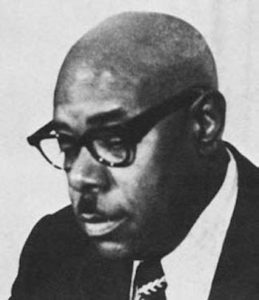
Nelson Edwards
*The birth of Nelson Edwards is celebrated on this date in 1917. He was a Black autoworker and labor union advocate.
Nelson 'Jack' Edwards was born on a Lowndes County, Alabama, farm. In 1937, he relocated to Detroit and began working at the Chrysler plant, where he became an active member of the local union. Inspired by his brother John, he began his union career during the 1930s, a period of growth for the coalition. He was elected UAW Union steward to represent Chrysler's Foundry plant workers. He was laid off from Chrysler in 1941 and later obtained a job at the Ford Lincoln Plant on Detroit's west side.
Immediately, Edwards became active in his new union, Local 900, which was then freely recognized by the Ford Motor Company. He served on the local education, citizenship, and by-laws committee and, in 1944, was chosen to be committee chairman. He was involved in Detroit's civic and political life, as well as in the State of Michigan and the nation, making numerous contributions. In 1947, Edwards became an International Representative assigned to Region 1A, Detroit's Westside. His first major assignment was as an organizer in the UAW's drive to win Caterpillar workers (Peoria, IL.) into the UAW and away from the Farm Equipment Workers. Following that successful campaign to swell UAW ranks with agricultural implement workers, Edwards returned to his region and became a servicing representative.
He helped handle plant problems in Ford Lincoln and several malleable iron plants. In 1948, Edwards and the UAW Foundry Conferences were synonymous since their founding in Milwaukee, Wisconsin. He completed 14 years as an International Representative. A dedicated union activist, Edwards rose through the union ranks, starting as a line steward. In May 1962, he became the first black man elected to the UAW's Executive Board. A year later, in May 1963, he was asked by the UAW President to go to Birmingham, Alabama, to assist blacks in their struggle for equality. He was re-elected to that executive board position three times and, in 1970, was elected union Vice President. He held this post for 15 years, when delegates appointed him to the UAW's International Executive Board.
A fighter in the struggle for American Civil Rights, he was one of the founders of the Trade Union Leadership Council (TLC) in 1957 and now TULC_MDLCA; one of the founders of the Negro Labor Council (NALC) in 1959, Headed by A. Philip Randolph; and one of the founders of the Coalition of Black Trade Unionist (CBTU) in September 1972. As Vice President of the UAW, he headed the following Departments and Councils: Alcoa, Allen Industries, Bendix, Borg-Warner, Budd, Die-Cast, Doehler-Jarvis, Donaldson, Drop Forge and Heat Treat, Eaton, Electric Storage Battery, Ex-Cell-O, Federal-Mogul, Foundry, FMC-Food Machinery, Heating-Air Conditioning-Radiation and Refrigeration, Hoover, Houdaille, Independents-Parts and Suppliers, Indian Head, Kelsey-Hayes, Koehring, McQuay-Norris, Midland-Ross, Modine, Motor Wheel, Purolator, Standard Products, Sundstrand Council, and Teledyne.
He was also Co-Director of the Manpower Training and Development Department and Chairman of UAW's Southeastern Michigan Community Action Program Council (SEMCAP). Jack was a member of several organizations, including the NAACP (life member), the Detroit Labor Action Council, New Detroit, Inc., and the Metropolitan Fund, Inc. United Foundation, COBTUU, Citizens Crusade Against Poverty, American Civil Liberties Union, Wayne County Stadium Authority, etc. Under the affirmative leadership of Edwards, the Foundry Conference gave birth to new concepts with the collective bargaining programs.
This included personal paid time off, the special Foundry pension program of 25 and out, on-the-job medical examinations for family and forge workers at no cost to the worker, and the federal law of pension reinsurances of private pension programs, all on the initiative of Nelson Jack Edwards and his pursuit for its enactment by Congress. Freedom Road remained his personal goal for all mankind: the right to live, learn, work, and play by the quality of the man and not the color of his skin, religion, ethnic background, or sex.
Nelson Jack Edwards, 57, the first black man to become a vice-president of the UAW and a long-time civil rights champion, was killed by a gunman on November 2, 1974. Nelson Jack Edwards' achievements continue to inspire and serve as a foundation for others to emulate and build upon. As a tribute to the lasting memory of Nelson Jack Edwards, the International Union dedicated to him one of the buildings at the Walter and May Reuther UAW Family Education Center at Black Lake.